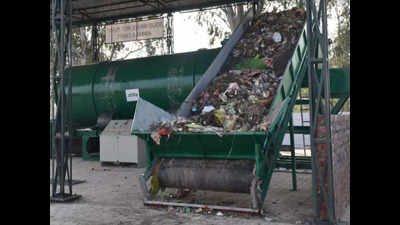- News
- City News
- noida News
- Noida’s first waste plant to treat 400 tonne/day
Trending
This story is from September 22, 2021
Noida’s first waste plant to treat 400 tonne/day
Trommel, scanner machines and a vending bridge became operational at the Lakhnawali dump site on Tuesday where over 3 lakh metric tonnes of legacy waste collected so far is to be disposed of. This is the city’s first remediation plant where the aim is to clear 400 MTs of waste per day. Greater Noida currently generates about 250 MTs of waste daily and the authority aims to clear the legacy waste in two years.

Representative image
GREATER NOIDA: Trommel, scanner machines and a vending bridge became operational at the Lakhnawali dump site on Tuesday where over 3 lakh metric tonnes of legacy waste collected so far is to be disposed of. This is the city’s first remediation plant where the aim is to clear 400 MTs of waste per day. Greater Noida currently generates about 250 MTs of waste daily and the authority aims to clear the legacy waste in two years.
For this, a contract of Rs 23 crore was awarded last month to the consortium of Antony Lara Enviro Solutions Pvt Ltd and AG Enviro Infra Projects Pvt Ltd.
A trommel machine comprising a perforated cylindrical drum placed at an elevated angle at the feed end is a mechanical screening machine that is used to segregate wet and dry waste materials. Other machines deployed at the site include conveyor belts and weighing machines.
On Tuesday, ACEO Deep Chandra inaugurated the plant. He said, “For sustained urban development, it's necessary to dispose of municipal waste in a scientific way. With this plant, we aim to reduce 50% of the total waste generated in the city and the remaining 50% will be recycled.”
According to GNIDA CEO Narendra Bhooshan, while legacy waste will be remediated, the remaining plastic and construction demolition waste will be segregated and sent to the recycling plant where the plastic waste will be recycled to make fuel as well as multi-layer boards including chairs, benches, tree guards etc., whereas construction and demolition waste will be used to build roads and fill potholes.
For this, a contract of Rs 23 crore was awarded last month to the consortium of Antony Lara Enviro Solutions Pvt Ltd and AG Enviro Infra Projects Pvt Ltd.
A trommel machine comprising a perforated cylindrical drum placed at an elevated angle at the feed end is a mechanical screening machine that is used to segregate wet and dry waste materials. Other machines deployed at the site include conveyor belts and weighing machines.
On Tuesday, ACEO Deep Chandra inaugurated the plant. He said, “For sustained urban development, it's necessary to dispose of municipal waste in a scientific way. With this plant, we aim to reduce 50% of the total waste generated in the city and the remaining 50% will be recycled.”
Salil Yadav, deputy general manager of GNIDA, said, “While we conducted trials earlier last month, we were waiting for the monsoon to get over to begin the work of waste remediation. Today we have started operations on a preliminary stage and expect to increase capacity depending on the weather condition in the coming days. The plant will remediate 400 MT of waste per day.”
According to GNIDA CEO Narendra Bhooshan, while legacy waste will be remediated, the remaining plastic and construction demolition waste will be segregated and sent to the recycling plant where the plastic waste will be recycled to make fuel as well as multi-layer boards including chairs, benches, tree guards etc., whereas construction and demolition waste will be used to build roads and fill potholes.
End of Article
FOLLOW US ON SOCIAL MEDIA










